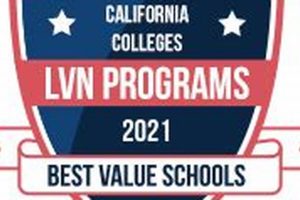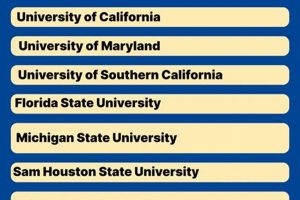California, a hub for numerous industries, presents a high demand for skilled accounting professionals. Top-tier educational institutions within the state offer rigorous programs designed to cultivate expertise in areas such as financial reporting, auditing, taxation, and managerial accounting. These programs often incorporate practical training, internships, and connections with prominent firms, providing graduates with a competitive edge in the job market.
A strong accounting education from a reputable California institution can open doors to diverse career paths in public accounting, corporate finance, government agencies, and non-profit organizations. The state’s dynamic economy provides a rich landscape of opportunities for career growth and advancement. Historically, California’s universities have played a significant role in shaping accounting practices and research, contributing to the profession’s evolution. Graduates from these institutions often become leaders in their fields, influencing financial decision-making and shaping economic policy.
This article will explore key factors to consider when selecting an accounting program in California, including curriculum rigor, faculty expertise, career resources, and alumni networks. Furthermore, it will delve into the unique strengths of specific institutions and the specialized programs they offer to meet the evolving demands of the accounting profession.
Tips for Selecting a Top Accounting Program in California
Choosing the right accounting program is a crucial step towards a successful career. Careful consideration of several factors can significantly impact future opportunities and professional growth.
Tip 1: Evaluate Program Accreditation: Accreditation by reputable bodies like the AACSB ensures a program meets rigorous quality standards. Look for programs holding this accreditation to guarantee a comprehensive and relevant education.
Tip 2: Assess Faculty Expertise: Experienced faculty members with strong industry connections can provide valuable insights and mentorship. Research faculty profiles and publications to gauge their expertise and areas of specialization.
Tip 3: Examine Curriculum Relevance: A robust curriculum should cover core accounting principles and emerging trends, such as data analytics and forensic accounting. Review course offerings to ensure alignment with career goals.
Tip 4: Consider Career Services Support: Strong career services departments offer resources like resume workshops, mock interviews, and networking events. Investigate the level of support provided to students and alumni.
Tip 5: Explore Internship Opportunities: Practical experience gained through internships enhances skills and builds professional networks. Look for programs with established internship partnerships with leading firms.
Tip 6: Investigate Alumni Networks: A strong alumni network can provide valuable career guidance and mentorship. Research the success and influence of alumni in the accounting field.
Tip 7: Assess Program Location and Culture: Consider the location of the institution and its overall culture. Proximity to major business centers can provide access to more internship and job opportunities.
By carefully considering these factors, prospective students can make informed decisions about their accounting education and position themselves for success in California’s competitive job market.
Selecting the right program lays the foundation for a rewarding career in accounting. The subsequent sections will delve into specific California institutions renowned for their accounting programs and the unique advantages they offer.
1. Academic Rigor
Academic rigor serves as a cornerstone of reputable accounting programs, particularly in a competitive landscape like California. Institutions recognized for producing highly skilled accounting professionals maintain rigorous academic standards that challenge students and cultivate a deep understanding of complex financial concepts. This rigorous approach is crucial for preparing graduates to meet the demands of the profession and contribute meaningfully to the field.
- Challenging Curriculum
A rigorous curriculum delves into advanced accounting theories and practices beyond the foundational level. This might include specialized courses in areas like forensic accounting, auditing, or tax law. Exposure to complex case studies and real-world simulations pushes students to apply their knowledge critically and develop problem-solving skills essential for success in the field. For example, students might analyze complex financial statements of publicly traded companies or simulate an audit process, thereby gaining practical experience within a controlled academic environment.
- High Faculty Expectations
High faculty expectations are integral to academic rigor. Professors in top accounting programs often hold advanced degrees and significant professional experience. They demand critical thinking, thorough research, and precise analysis from their students. This could involve challenging assignments, rigorous grading standards, and an emphasis on independent learning. These high expectations ensure graduates possess the analytical skills and meticulous approach necessary for a successful accounting career.
- Emphasis on Research and Analysis
Leading accounting programs cultivate research and analytical skills through coursework and dedicated research opportunities. Students are encouraged to engage with current research in accounting and explore emerging trends impacting the field. This might involve conducting independent research projects, analyzing industry data, or presenting findings at academic conferences. This focus on research equips graduates with the ability to adapt to evolving accounting practices and contribute to the profession’s ongoing development.
- Focus on Practical Application
While theoretical knowledge is fundamental, reputable programs also emphasize practical application. This is often achieved through internships, case competitions, and simulations that bridge the gap between academic learning and real-world experience. Students gain hands-on experience in applying accounting principles to solve practical business problems, preparing them for the complexities of their future careers. This practical focus ensures graduates are not only theoretically sound but also possess the practical skills necessary to thrive in a professional setting.
These elements of academic rigor, collectively, contribute to the quality and reputation of accounting programs in California. Graduates from institutions prioritizing these aspects are well-equipped to navigate the intricacies of the accounting profession and contribute meaningfully to the field. They enter the workforce with a strong foundation in accounting principles, analytical skills honed through rigorous coursework, and practical experience gained through real-world applications. This comprehensive preparation is what distinguishes graduates from the best accounting schools in California and positions them for success in their careers.
2. Faculty Expertise
Faculty expertise stands as a critical pillar supporting the reputation of California’s top accounting programs. A distinguished faculty contributes significantly to the quality of education and the success of graduates. Deep subject matter knowledge, combined with practical experience and ongoing research, enriches the learning environment and prepares students for the complexities of the accounting profession. The presence of accomplished scholars and experienced practitioners enhances an institution’s standing and attracts high-achieving students. For example, a professor with a background in forensic accounting, actively involved in high-profile fraud investigations, brings unique insights and practical perspectives to the classroom. Similarly, faculty members publishing cutting-edge research in tax law contribute to the body of knowledge and elevate the institution’s academic reputation.
The impact of faculty expertise extends beyond the classroom. Experienced faculty members often cultivate strong relationships with leading accounting firms and industry organizations. These connections create valuable internship and career opportunities for students. Faculty mentorship, guided by real-world insights, provides invaluable guidance as students navigate their career paths. Furthermore, faculty research activities often involve students, offering opportunities to contribute to original scholarship and gain hands-on research experience. This direct involvement in research not only deepens students’ understanding of accounting concepts but also strengthens their analytical and critical thinking skills. The combination of academic rigor and practical experience fostered by expert faculty contributes significantly to the success of graduates in the competitive job market.
In summary, faculty expertise serves as a key differentiator among accounting programs in California. It directly influences the quality of education, the availability of career opportunities, and the overall success of graduates. Institutions investing in and retaining highly qualified faculty demonstrate a commitment to providing students with a superior learning experience. The presence of a respected and accomplished faculty is a crucial indicator of a high-quality accounting program and a key factor to consider when selecting an institution for accounting education in California. This understanding underscores the crucial role faculty expertise plays in shaping the future of the accounting profession within the state.
3. Career Resources
Robust career resources are a defining characteristic of top accounting programs in California. These resources play a pivotal role in connecting students with prospective employers and facilitating successful career transitions. The availability and effectiveness of career services significantly impact graduates’ preparedness for the competitive job market and long-term career trajectory. Institutions recognized for excellence in accounting education understand the critical link between academic preparation and career placement, investing heavily in comprehensive career support systems. This commitment to career development distinguishes the best accounting schools in California and contributes to their graduates’ high placement rates and career success.
- Internship Placement Programs
Strong internship programs provide students with invaluable practical experience and networking opportunities. Top schools often maintain partnerships with leading accounting firms, corporations, and government agencies, facilitating access to competitive internships. These experiences allow students to apply classroom learning in real-world settings, develop professional skills, and build connections with potential employers. For example, an internship with a Big Four accounting firm exposes a student to diverse audit engagements, strengthens technical skills, and provides valuable exposure to the firm’s culture. This practical experience becomes a significant asset in the job search process, giving graduates a competitive edge.
- Career Counseling and Advising
Individualized career counseling and advising provide students with personalized guidance in career exploration, resume and cover letter writing, interview preparation, and job search strategies. Experienced career advisors help students identify their strengths, explore career options aligned with their interests, and develop effective job search plans. This personalized support is particularly valuable for students navigating the complexities of the accounting job market and making informed career choices. Tailored advice on networking, professional development, and career advancement strategies equips graduates with the tools necessary to launch successful careers.
- Networking Events and Employer Connections
Top accounting programs organize networking events, career fairs, and on-campus recruiting sessions, providing students with direct access to prospective employers. These events facilitate valuable connections with recruiters, industry professionals, and alumni, creating opportunities for internships, job offers, and mentorship. For instance, a dedicated accounting career fair allows students to interact with representatives from various firms, learn about different career paths, and make a strong first impression on potential employers. Such direct interaction significantly enhances job search effectiveness and opens doors to a wider range of opportunities.
- Alumni Networks and Mentorship Programs
A strong alumni network serves as a valuable resource for career guidance, mentorship, and job referrals. Successful alumni often return to their alma mater to share their experiences, provide career advice, and connect students with job openings within their organizations. Formal mentorship programs facilitate these connections, pairing students with experienced professionals in their chosen fields. This access to a network of successful professionals provides invaluable support and guidance as graduates transition into their careers and navigate the complexities of the accounting profession.
The strength of career resources directly correlates with the overall quality of an accounting program. These services bridge the gap between academic preparation and professional success, providing students with the tools and connections necessary to thrive in California’s competitive accounting job market. By prioritizing career development, the best schools for accounting in California ensure their graduates are not only academically prepared but also well-equipped to launch successful and fulfilling careers. The commitment to career resources demonstrates a dedication to student success that extends beyond graduation, impacting long-term career trajectories and contributing to the overall strength of the accounting profession in California.
4. Industry Connections
Strong industry connections are a hallmark of leading accounting programs in California. These connections represent a symbiotic relationship between educational institutions and the professional world, benefiting both students and the accounting industry. Top schools cultivate relationships with prominent accounting firms, corporations, and regulatory bodies, creating a pipeline of talent and ensuring curriculum relevance. This close alignment with industry needs ensures graduates possess the skills and knowledge sought by employers, facilitating seamless transitions into the workforce. For instance, partnerships with Big Four accounting firms often lead to dedicated internship programs, providing students with practical experience and exposure to real-world audit engagements. Similarly, collaborations with industry organizations offer students insights into emerging trends, such as data analytics and cybersecurity in accounting, enhancing their preparedness for evolving industry demands. This interplay between academia and industry ensures curriculum remains current and relevant, reflecting the dynamic nature of the accounting profession.
The practical significance of these industry connections is evident in the enhanced career prospects for graduates. Networking events, guest lectures by industry leaders, and collaborative research projects provide students with unparalleled access to the professional world. These opportunities not only build valuable connections but also offer insights into diverse career paths within accounting. For example, a guest lecture by a Chief Financial Officer (CFO) can expose students to the strategic aspects of accounting within a corporate setting, while a networking event with forensic accountants can highlight the intricacies of fraud investigations. Such exposure broadens students’ understanding of the profession and allows them to make informed career choices. Furthermore, industry partnerships often translate into preferential hiring opportunities for graduates, giving them a competitive edge in the job market and contributing to high placement rates for top programs.
In conclusion, strong industry connections are not merely a desirable attribute but a crucial component of the best accounting schools in California. They represent a dynamic interplay between academic learning and practical application, ensuring graduates possess the skills, knowledge, and connections necessary to thrive in the accounting profession. This symbiotic relationship benefits students, educational institutions, and the industry as a whole, contributing to a robust and evolving accounting landscape in California. The cultivation of these connections is a testament to a program’s commitment to preparing students for successful careers and its integral role in shaping the future of the accounting profession. Recognizing the importance of industry connections provides prospective students with a key criterion for evaluating accounting programs and making informed decisions about their educational and career paths.
5. Alumni Network
A robust alumni network is a significant indicator of a top-tier accounting program, particularly in a competitive market like California. The strength and engagement of an alumni network directly reflects the quality of the institution and its commitment to long-term student success. For prospective students, the alumni network offers valuable insights into career paths, industry trends, and the overall value of a specific program. A strong alumni presence within leading firms signifies the program’s effectiveness in preparing graduates for successful careers and its influence within the California accounting landscape. Evaluating the breadth and depth of an alumni network provides a crucial perspective for those seeking the best accounting education in California.
- Mentorship and Guidance
Alumni networks facilitate mentorship programs, connecting current students with experienced professionals in their field. This guidance can prove invaluable in navigating career choices, gaining industry insights, and developing professional skills. For example, an alumnus working in forensic accounting can mentor a student interested in this specialization, providing advice on relevant coursework, internship opportunities, and career paths. This personalized guidance enhances the educational experience and strengthens the student’s professional network.
- Networking and Job Opportunities
Alumni networks offer extensive networking opportunities, connecting graduates and current students with potential employers. Alumni often serve as recruiters or hiring managers within their organizations, creating a direct pipeline of talent from their alma mater. This connection can significantly benefit graduates seeking employment in California’s competitive accounting market. For example, alumni working in prominent accounting firms can inform students about open positions, provide referrals, and offer insights into the hiring process. This access to a professional network significantly enhances career prospects.
- Industry Insights and Trends
Engaged alumni networks provide current students with valuable insights into industry trends, emerging technologies, and best practices. Alumni working in various accounting roles can share their experiences, offer perspectives on current challenges, and provide guidance on relevant skill development. This exposure to real-world practices enhances the relevance of academic learning and prepares students for the evolving demands of the profession. For instance, alumni working in data analytics can offer insights into the growing importance of data analysis skills in accounting and advise students on relevant certifications and training programs.
- Program Development and Support
Successful alumni often contribute to their alma mater’s program development by providing feedback on curriculum relevance, suggesting improvements, and supporting initiatives that enhance the student experience. This ongoing engagement ensures the program remains aligned with industry needs and maintains a high standard of quality. Alumni contributions, both financial and through active participation, demonstrate a commitment to the program’s continued success and its ability to produce highly skilled accounting professionals. This continuous feedback loop strengthens the program’s reputation and ensures its graduates remain competitive in the job market.
The strength of an alumni network is a key indicator of a successful accounting program. It represents a continuous cycle of support, mentorship, and professional development that benefits both graduates and current students. In the context of California’s competitive accounting landscape, a robust alumni network provides a crucial advantage, connecting graduates with opportunities and contributing to the long-term success of individuals and the profession as a whole. Therefore, prospective students should consider the strength and engagement of the alumni network as a significant factor when evaluating accounting programs in California. This understanding provides a comprehensive perspective on the long-term value and potential impact of choosing a program with a strong and active alumni community.
Frequently Asked Questions
This section addresses common inquiries regarding the pursuit of an accounting education in California.
Question 1: What are the typical admission requirements for accounting programs in California?
Admission requirements vary among institutions but generally include a strong academic record, particularly in mathematics and business-related courses. Standardized test scores (SAT/ACT), letters of recommendation, and personal essays may also be required. Some programs may require prerequisite coursework in accounting or related fields.
Question 2: How long does it take to complete an accounting degree in California?
A bachelor’s degree in accounting typically requires four years of full-time study. Accelerated programs may allow completion in a shorter timeframe. Graduate programs, such as a Master of Science in Accounting (MSA) or a Master of Business Administration (MBA) with an accounting concentration, typically take one to two years.
Question 3: What is the job outlook for accounting graduates in California?
California’s diverse economy presents a strong demand for accounting professionals. The job outlook for accounting graduates is generally positive, with opportunities in public accounting, corporate finance, government, and non-profit organizations. Specific career paths and growth potential may vary based on specialization and level of education.
Question 4: How important are internships for accounting students in California?
Internships are highly valued by employers and provide students with crucial practical experience. Many California accounting programs facilitate internship opportunities with leading firms and organizations, providing students with a competitive edge in the job market and valuable networking opportunities. Practical experience gained through internships often translates into higher starting salaries and faster career advancement.
Question 5: What are the licensing requirements for Certified Public Accountants (CPAs) in California?
Becoming a licensed CPA in California requires passing the Uniform CPA Examination, meeting specific educational requirements (typically 150 semester units), and fulfilling experience requirements. Specific details regarding the licensing process can be found on the California Board of Accountancy website.
Question 6: How does the cost of living in California affect the choice of accounting program?
The cost of living in California, particularly in major metropolitan areas, can be a significant factor. Students should consider tuition fees, housing costs, and other living expenses when evaluating different programs. Financial aid, scholarships, and part-time employment opportunities can help offset these costs. Comparing the overall cost of attendance across different institutions is crucial for making informed decisions.
Careful consideration of these frequently asked questions, alongside thorough research of specific programs, will aid prospective students in making informed decisions aligned with individual career goals and circumstances. The pursuit of an accounting education in California offers promising career prospects within a dynamic and evolving economic landscape.
This concludes the frequently asked questions section. The following section will explore specific California institutions renowned for their accounting programs, offering detailed insights into their unique strengths and program offerings.
Choosing the Right Path
California’s dynamic economy and diverse industries create a significant demand for highly skilled accounting professionals. This article explored key factors to consider when selecting among the best accounting programs California offers. Academic rigor, distinguished faculty expertise, robust career resources, strong industry connections, and influential alumni networks collectively contribute to a superior educational experience and successful career outcomes. Emphasis was placed on the importance of aligning program selection with individual career aspirations and considering factors like program accreditation, curriculum relevance, and the availability of practical training opportunities. A thorough understanding of these elements equips prospective students to make informed decisions that lay the foundation for a rewarding career in accounting.
The accounting profession plays a vital role in California’s economic landscape. Selecting the right educational path is paramount for individuals seeking to contribute to this dynamic field. A well-informed decision, based on careful consideration of the factors presented in this article, empowers aspiring accounting professionals to embark on a successful and fulfilling career journey in California. Further research and engagement with specific institutions will provide a deeper understanding of individual program offerings and facilitate the pursuit of the best accounting education California has to offer.







